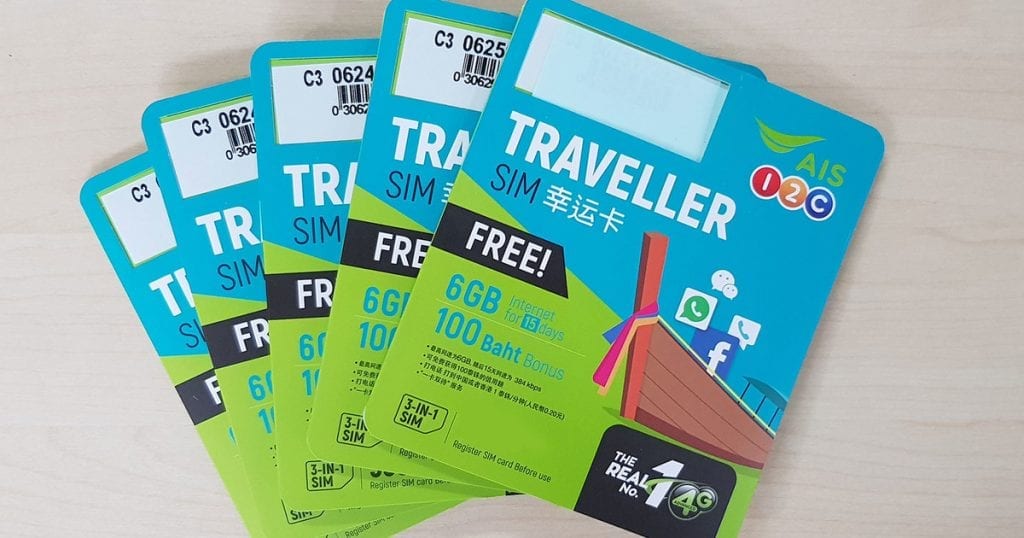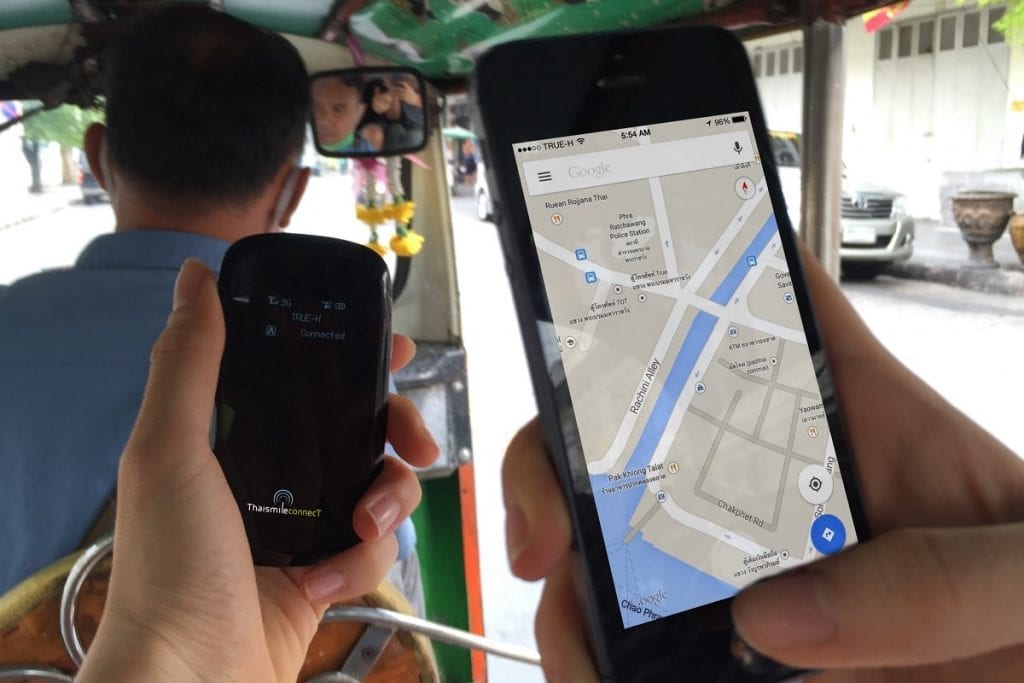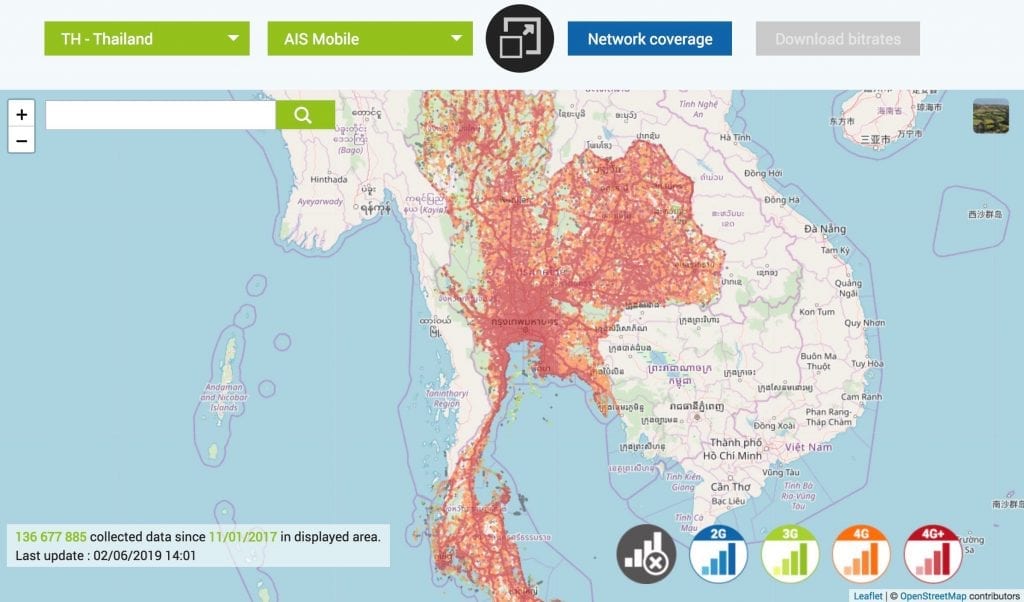Traveling globally, whether for business or for pleasure is becoming a more common activity for many people.
With affordable flights and hotels, a dynamic culture, and amazing natural and historical sites, Thailand is quickly becoming a popular destination for globe trotters and businesses alike.
Today’s traveler generally doesn’t like to be out of touch for too long, so it is important to know how to stay connected, by internet and cell phone while you are visiting Thailand.
Many business travelers demand access to the internet, to stay connected with the office, while pleasure travelers or digital nomads want a reliable way to stay in touch with family or to conduct their own business.
Before you journey to Thailand, it is good to know how to easily stay connected using your cell phone and the internet.
Being well prepared, and understanding how to get connected, before you get there, will ease stress and make your journey more enjoyable.
Contents
Will any cell phone work in Thailand?

Cell phones in Thailand work a bit differently than they do here in the US.
It’s important that you understand this difference before you land in Thailand and try to use your “American” phone.
The first thing you need to know about cell phones, is that most US cell phones are “locked”, meaning they are programed to work for only one particular mobile carrier.
For instance, if your current mobile carrier is T-Mobile, your US smart phone, will only work with your plan, in the US, on T-Mobile’s network.
This doesn’t mean that your phone won’t work at all in Thailand, but if you do use it, as is, expect to pay hefty international calling fees with your US carrier.
And, frankly, your “American” cell phone the least reliable way to travel with a cell phone in Thailand.
To solve this problem, when you travel to Thailand you have two options.
First, you can have your smart phone “unlocked”, so that it will accept service from any carrier, and any SIM card, anywhere in the world.
Once your phone is unlocked, you can simply purchase a SIM card for any of the local carriers, along with a pre-paid calling card, and your phone is ready to go.
For many people that travel internationally on a regular basis, this may be the most practical and low-cost option.

A SIM card will cost you around $5, and a prepaid calling card will cost you anywhere from $5 to $20 depending on how much time you want.
The second option is to purchase a cell phone once you arrive in Thailand.
The great thing about this option is that all cell phones sold in Thailand are “unlocked”.
So once you purchase your phone, you can simply swap SIM cards in each international location you visit.
A new cell phone in Thailand will cost you around $70.
For a small investment, you will come home with a new cell phone that will work just about anywhere in the world.
SIM cards and cell phones can be purchased at a variety of booths in the airport, so you can be ready for connected travel, before you pick-up your luggage.
An important bit of information… in the last few years, the Thailand government has begun to require the registration of new tourist phone numbers.
This is a simple process, but you will need to present your passport at the time of purchase, for both of the options we mentioned.
Is there WiFi everywhere in Thailand?

Internet access is becoming a nearly necessary part of life, in every corner of the globe.
Thailand is quickly expanding their internet resources, just like most countries.
When you are traveling in Thailand, you should find it fairly easy to access WiFi, in most locations that you visit.
However, there are still places that you will want to know your options for connecting to the internet, by other means.
For the most part, WiFi is readily accessible in most major Thai cities. Most hotels are now offering WiFi to guests.
However, some smaller hotels may still charge a nominal fee to access their WiFi.
This is something that you may want to investigate before you book your hotel rooms.
If you are planning on using the internet frequently while you are in Thailand, you will want to find hotels that offer WiFi for free.
Your best bet is to stay in larger hotels, or hotel chains.
Additionally, you can also find WiFi in many restaurants, bars, and public places.
Restaurants and bars may require that you purchase a drink or a small bite to eat to sit and use their WiFi.
Public places may also charge for WiFi access, so make sure you have a plan before you head away from the luxury of your hotel.
In more rural areas, high-speed internet is still being developed, and you may find it more difficult to find free WiFi or any WiFi at all.
However, that doesn’t mean that you are left being out of touch.
The internet is gaining quick popularity throughout Thailand, so even most small communities are equipped with a local internet café.
For just a few baht you can get 20 to 30 minutes of access in an internet café.
Just remember, these are quite public, and quite popular, so use safe internet practices, and avoid using credit cards or other identifying information, unless absolutely necessary.
Best Mobile Network for Tourists in Thailand

Just like in the US, there are a number of mobile carriers in Thailand.
However, because the way the cell phone service works in Thailand, there isn’t much difference between the carriers, especially for tourist phones.
There are three major carriers for tourist cell phone SIM cards and phones: True, DTAC and AIS.
All of these carriers provide reliable 3G service and there isn’t much variation between their service or reliability.
If you don’t need super-fast speeds or can manage with less time on the internet, just pick the carrier that is the lowest cost.
If, however, you need a faster internet connection, or need to be connected to the internet frequently, even in more remote locations, the carrier to select is AIS.

They are reasonably priced for a tourist SIM card and have the most reliable 4G service.
Once upon a time, this was not the case with AIS, however they’ve improved their network, and today, you can rely on them to give you good 4G service at all of the popular tourist locations, even the more remote islands and must-see spots.
If you are going to be spending an extended amount of time in one particular place, and need reliable cell phone and internet connectivity, visit opensignal.com, before you leave.
This site will show you the best carrier, for the location you’ll be staying.
This way you’ll know you have the most reliable carrier, with the best service, where you’ll be spending most of your time.
Just like most places that you’ll travel internationally, WiFi is generally easy to come by in in Thailand.
If you want to stay connected, and not spend a ton of money, look for hotels and local spots that have free WiFi, and make sure you pick up your SIM card or cell phone in the airport before you head on your way.
You’ll find that staying connected in Thailand is easy, and almost as reliable as being at home.
Do you have any tips on staying connected? Share with us in the comments.


